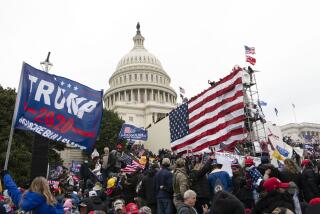2 Key Charges Against North Dropped; White House Fights Subpoenas
- Share via
WASHINGTON — The judge in the Iran-Contra case dismissed two major charges against Oliver L. North on Friday, saying “the court is powerless” to do otherwise. White House lawyers, meanwhile, moved to stop North’s effort to force President Reagan and President-elect Bush to testify.
In trying to keep Reagan and Bush from being called as witnesses, the Administration raised the threat of a constitutional battle “of potentially major dimensions” and said it has been offering to respond in writing since last Sept. 28 to any “reasonable written questions” the former White House aide might ask as part of his defense.
“The spectacle of a former or sitting President being subjected to peremptory judicial process may chill foreign governments in the way they deal with the President now and in the future,” the government said in a motion to quash the subpoenas for Reagan and Bush.
Twelve criminal charges remain against North, and the issue of dealing with classified information in open court continues to be a problem. Attorneys for both sides met privately in the judge’s chambers after Friday’s open session to discuss matters relating to the Classified Information Procedures Act.
Trial Set for Jan. 31
North’s lawyers have subpoenaed Reagan and Bush to testify at the trial, now set for Jan. 31, but no sitting President has ever testified in person in court.
Disclosure of White House willingness to answer questions in writing came in a 27-page brief by Atty. Gen. Dick Thornburgh, who said that North “has not identified any of the issues on which he wishes to examine the President or president-elect and has not demonstrated the need for their testimony.”
“Until he does so,” wrote Thornburgh, “there can be no justification for precipitating constitutional litigation of potentially major dimensions by compelling an in-court appearance by a sitting or former President.”
He said Reagan “will consider furnishing appropriate information in writing in response to reasonable written questions, if limited to material subject matter.” He said Bush “joins that offer.”
Subpoenas Served
North’s lawyers, meanwhile, served the Justice Department with subpoenas for Reagan and Bush to turn over various personal papers for use by the defense, said department spokesman Loye Miller.
The Administration filed its motion to quash the subpoenas for Reagan’s and Bush’s personal testimony four hours after U.S. District Judge Gerhard A. Gesell declared at a hearing that he had no power to stop the government’s abandonment of conspiracy and theft counts against North.
Because of national security concerns, Thornburgh and independent counsel Lawrence Walsh apparently “are unable to prosecute” North on charges of diverting more than $14 million in U.S.-Iran arms sale proceeds to the Nicaraguan rebels, Gesell said.
“The court is powerless to direct a case to proceed,” the judge said.
Dismissal Asked
Walsh asked on Jan. 5 that Gesell dismiss the charges of conspiracy and theft of government property, citing North’s insistence on introducing classified information in his defense and the refusal by the Reagan Administration to release material that the judge ruled North must be able to use at trial.
Gesell refused to dismiss the charges until he received an affidavit from Thornburgh outlining the Administration’s decision to withhold classified data.
Thornburgh stopped short of that, supplying instead a two-page declaration saying that if Walsh had disagreed with the Reagan Administration’s refusal to declassify material, the attorney general would have filed an affidavit “objecting to disclosure of this classified information.” Gesell said Thornburgh’s filing met the “minimum standard” under the Classified Information Procedures Act.
The court has “no factual basis for questioning” material that the government has classified or its effect on national security if the material should be disclosed, said Gesell.
Texts of Reports
The classified material in question includes names of Central American countries and verbatim texts of intelligence reports.
Meanwhile, John Keker, the head of Walsh’s prosecution team, said North’s defense team is subpoenaing 50 CIA agents in the case, some of whom are now serving overseas and are concerned about having to appear on 48 hours’ notice at the request of the defense once a trial gets under way.
Barry Simon, one of North’s attorneys, said Keker should not “concern himself” with the problem.
Attorneys for both sides held closed-door morning and afternoon sessions with the judge on classified information as it relates to the remaining 12 counts. The attorneys will resume the discussions Tuesday.
Classified Information
Walsh said in a court filing Thursday that the remaining charges can be tried “without opening the door” for North “to use reams of classified information” and that North should be barred from seeking to prove “a host of irrelevant matters for the sole purpose of scuttling the entire case” on national security grounds.
But defense attorney Brendan Sullivan said: “Classified information pervades the remaining charges as well.”
Nine of the counts focus on charges that North concealed from Congress and former Atty. Gen. Edwin Meese III his efforts on behalf of the Contras. Four of the nine deal with alleged concealment of a diversion of money to the Contras from the Administration’s secret arms sales to Iran.
North also is accused of illegally accepting a $13,800 security system at his home from co-defendant Richard Secord, converting to his own use at least $4,300 in traveler’s checks from Contra leader Adolfo Calero and conspiring to defraud the Treasury of tax revenue in connection with charitable contributions supporting the Contras.
More to Read
Get the L.A. Times Politics newsletter
Deeply reported insights into legislation, politics and policy from Sacramento, Washington and beyond. In your inbox twice per week.
You may occasionally receive promotional content from the Los Angeles Times.








